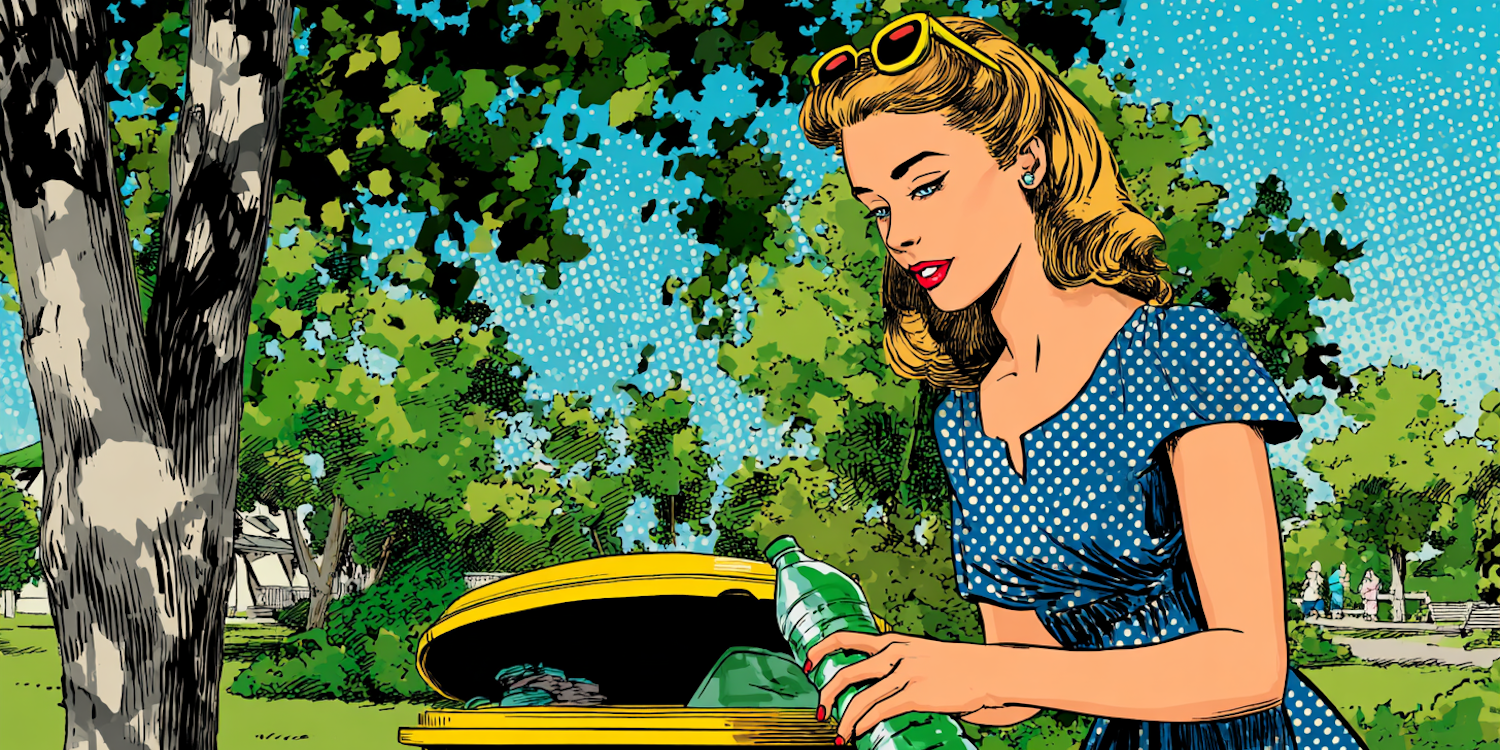You jot down a long list of climate-conscious goals while you’re feeling motivated and optimistic. This time you’re really going to do it. You arm yourself with a reusable bag and a habit tracker and dive right in.
But after only a couple of weeks, you start getting worn out. Eventually, you find yourself going back to your old habits.
Does this sound familiar? If so, you’re not alone. Most New Year’s Resolutions last an average of 36 days. However, this doesn’t mean you should give up on your plans! Working to make sustainable changes in your life is a critical goal — and it’s completely doable.
5 Sustainable Wins You Can Complete in 10 Minutes or Less
Not all wins for the planet require a lot of time. Each of these ideas takes 10 minutes or less — so you could even check a few off your to-do list today!
Switch to Paperless Notices
Have you ever noticed how much of your mail you glance at once before throwing away? Each envelope may not seem significant on its own, but they add up over time. One organization estimates that unwanted mail destroys over 100 million trees and creates over 51.5 billion tons of carbon emissions every year.
You can save yourself time and cut down on waste by going paperless whenever possible. Ask insurance companies, financial institutions, or medical providers to send you notices by email. And if you’re still getting magazines and ads you subscribed to years ago, take an extra moment to remove your name from their list.
Donate to a Sustainable Organization
Choose a cause you’re passionate about and make a commitment to give. If you’re able to, consider setting up a monthly donation. For the price of a meal (or your favorite streaming service) you can help fund sustainable projects around the world.
Some ideas include:
- Nature Conservancy: Helping humans and nature thrive together
- Rozalia Project: Researching and promoting ocean health
- World Wildlife Fund: Protecting vulnerable species of animals
- OffGridBox: Providing clean drinking water to underserved communities
If you’re not able to contribute financially, you can still pitch in and make a difference by raising awareness, organizing a fundraiser, or volunteering your time.
Save Resources at Home
You can cut down your energy bill and your carbon footprint by conserving the resources you use at home. Try starting with quick changes like:
- Changing the thermostat by one degree
- Closing off unused areas of your home
- Turning off lights when you leave the room
- Fixing leaky faucets
- Washing full loads of dishes and laundry
You may not notice a difference at first, but your wallet will!
Join a Sustainable Online Community
Being part of a community gives you access to ideas, inspiration, resources and help. See if there’s a sustainable or zero-waste group in your area by checking social media, the library, or a local university.
We’d also love to have you in our Lochtree Facebook group. We share fresh ideas for living sustainably, as well as keeping you up to date on the latest climate news.
Use Ecosia to Plant Trees When You Search the Web
Ecosia is a search engine that plants trees when you use their service. To date, they’ve planted over 139 million trees! Ecosia is constantly updating their library and search results — and if you ever need a more comprehensive search, you can always pop over to your old go-to engine
6 Easy Ways to Add Sustainability to Your Routine

Making one-time changes is a great way to gain momentum. Now you’re ready to make sustainability an ongoing part of your New Year routine!
Choose Reusables
From plastic bags to paper towels, disposable items create a huge amount of waste. They use resources like trees, water and fossil fuels to make. And after use, they usually end up polluting landfills or the environment. Luckily, making the switch to reusables is easy and often budget-friendly too.
Try swapping:
- Disposable bottles for a reusable water bottle
- Paper towels for reusable dishcloths or cut-up rags
- Plastic food storage bags for reusable jars or beeswax wraps
- Single-use cutlery for a reusable flatware set
- Disposable grocery bags for reusable string bags
Once you take a closer look at the disposable items in your routine, you’ll be amazed at how much waste you can save by choosing reusable products. And when others see your water bottle or meal kit, they may start to think differently about the products they use, too.
Recycle Smarter
On average, only about nine percent of plastic gets recycled. Unfortunately, some plastic is rejected from recycling plants when consumers recycle incorrectly. You can help your recyclables make it to the end of the process by learning how to recycle smarter!
Always be sure to rinse and dry containers completely before adding them to your bin. Never leave food waste inside — one bad container can spoil an entire truckload. You can also check with your local recycling facility to see what they accept so that you only send the right materials.
Reduce Food Waste

Food waste in landfills creates methane, a powerful greenhouse gas that contributes to climate change.
Sustainability writer Sarah Breeze recommends thinking like a chef to cut down on waste. Since chefs focus on efficiency, they work hard to get the most out of each ingredient. So unleash your inner chef by:
- Making a meal plan with recipes you’ll actually eat
- Checking your fridge and pantry before you go shopping
- Using the “first in, first out” method to use older items first
- Prepping ingredients in advance
- Trimming food sparingly to avoid excess waste
- Saving vegetable scraps to make stocks or soups
- Composting fruit and vegetable scraps
Keep experimenting until you find a method that works for you. Then you can spend less time and money on wasted food and enjoy the dishes you love.
Learn to Make Your Own Staples
Another way to bring sustainability into your kitchen is by learning how to make some of the staple ingredients you use regularly. This lets you cut down on waste and savor the fresh taste of homemade food.
Some easy staples to start with include salad dressings, hummus and salsa. Once you try your hand at a few basic recipes, try more challenging items like plant milk, bread or jam.
You can also make simple, green cleaners to use around the kitchen and your home. That way you avoid harsh ingredients and wasteful plastic bottles. Vinegar, rubbing alcohol and castile soap are amazingly versatile ingredients for DIY cleaners.
Lower Your Transportation Footprint
There are so many ways you can get from Point A to Point B. When possible, choose greener transportation to help lower your carbon footprint.
Try walking, biking, carpooling or using public transportation. And combine trips whenever you can to save time and fuel!
Declutter Thoughtfully
If you’re like me, you love starting the New Year with a clean slate. For me, that often means clearing out clutter and freshening up my space. One way to make your New Year more sustainable is by decluttering with the planet in mind.
Instead of filling plastic bags and taking them to the dump, consider the best way to dispose of each item. This could include repurposing, recycling, composting or donating to responsible charities.
7 Ideas for Sharing Sustainability with Others
One of Lochtree’s core values is community. We believe that joining together is the best way to work toward a more sustainable future. And when you share your love for sustainable living with others, your impact continues to grow.
Rethink the Way You Gift
Giving gifts is a key part of many special events. Luckily, you can live more sustainably without sacrificing this tradition. When birthdays and holidays come around, chat with your loved ones about eco-friendly gifts. This could include reusable products, experiences or simply time together. Once your loved ones discover how meaningful sustainable gifts can be, they may decide to adopt the tradition themselves.
Swap Stuff to Buy Less
When I was growing up, some of my favorite toys and clothing came from my older cousins. We were at an age when we outgrew items before we wore them out, so sharing between families benefited everyone.
On a small scale, consider asking around to see if you can borrow or trade for something before buying it. On a larger scale, you can arrange a group swap with family, coworkers or neighbors. Everyone can bring a few things they no longer need and take things they’ll use. That way you can all get rid of unwanted clutter and give products a new life.
Go Potluck Style
Next time you host a meal or gathering, try a new kind of potluck style. Invite people to bring a set of their own dishes and silverware so you don’t have to buy disposables. They can even bring their own containers for leftovers. This helps eliminate unnecessary waste — and brings a fun twist to your time together.
Ask for a Recycling Program
More cities are starting to offer curbside recycling. If your area doesn’t yet have this service, consider visiting with your local representatives. Talk with your library about hosting a recycling forum and collecting signatures from interested citizens. Building a recycling program may take time, but you can help get the ball rolling!
Organize a Litter Pickup
Get together with neighbors and friends to clean up trash in your area. Removing litter from the environment helps prevent microplastic pollution. It also keeps local wildlife from mistaking garbage for food. Remember to use gloves when handling trash.
Create a Community Compost Bin
Find out if your city has a municipal compost facility nearby. If not, check local regulations to see if you can start your own. Chat with your neighbors about composting and invite them to bring over their compostable waste. Once it’s ready, share it between your gardens or add it to a community plot.
Start a Community Garden
Check with your city hall to see if there’s a community garden in your area. If not, talk with them about setting one up. Then, find a few plant-savvy neighbors and friends to get things started.
Some easy starter plants include tomatoes, potatoes, zucchini, onions and garlic. You can arrange a basic schedule to take turns caring for the plants and share the delicious results when harvest time comes.
A Slow and Steady Path to Sustainability
There are so many ways you can integrate sustainability into your life. While this is a good thing, it also makes it easy to become overwhelmed. So start by picking one or two changes you want to make. Once you’ve mastered those, you’ll have the confidence to move on to something else.
Remember — even the Grand Canyon was created by small rivers flowing over time. If a simple, steady effort can carve hundreds of feet of rock, just imagine what you can do!
Do you have any sustainability goals for this year? Are there areas you’re struggling with? Let us know in the comments!






